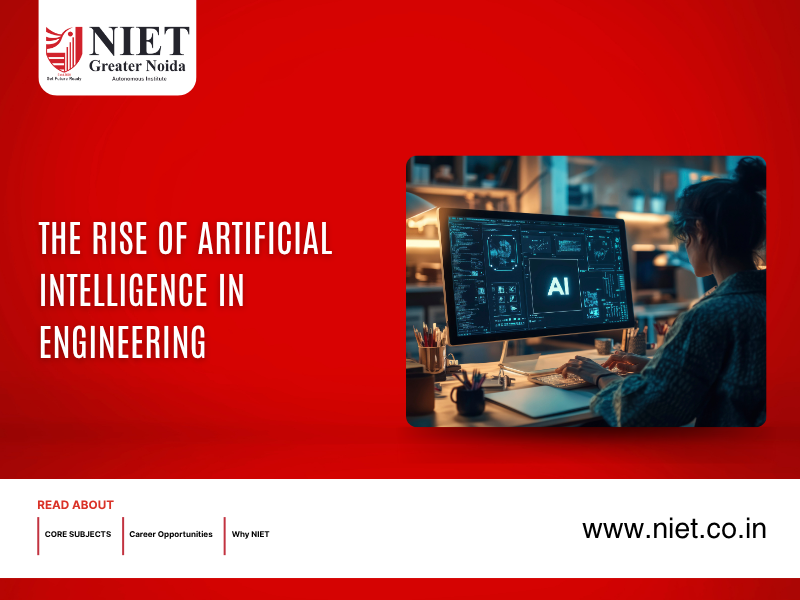The impact of Artificial Intelligence (AI) on modern technology is undeniable. From self-driving cars to intelligent robots and predictive maintenance systems, AI is transforming how industries operate and how engineers design, analyze, and innovate. In today’s rapidly advancing world, understanding Artificial Intelligence has become an essential skill for every college student pursuing an engineering degree.
AI is no longer a futuristic concept; it’s a present-day reality shaping the core of engineering education, product development, and industrial growth.
Understanding Artificial Intelligence in Engineering
At its core, Artificial Intelligence refers to machines or systems that simulate human intelligence to perform tasks such as reasoning, learning, and problem-solving. In the field of engineering, AI integrates with technologies like machine learning, data analytics, and robotics to create smarter and more efficient solutions.
By leveraging massive data sets and predictive algorithms, engineers can now design systems that adapt, learn, and optimize automatically, improving precision, reducing costs, and increasing productivity.
Whether it’s automating a manufacturing line, developing smart infrastructure, or managing complex networks, Artificial Intelligence has become a driving force behind engineering innovation.
Applications of Artificial Intelligence Across Engineering Fields
Artificial Intelligence has found applications in nearly every engineering discipline, making it one of the most versatile technologies of our time. Here’s how it’s shaping various sectors:
1. Mechanical Engineering
AI enables predictive maintenance, advanced simulations, and intelligent robotics. Engineers use AI-based systems to forecast equipment failures, design efficient machinery, and automate repetitive production processes.
2. Electrical and Electronics Engineering
From smart grids to embedded systems, Artificial Intelligence optimizes power distribution, enhances circuit design, and supports energy-efficient operations. It’s a cornerstone of today’s smart devices and IoT-driven systems.
3. Civil Engineering
AI assists in designing sustainable structures through advanced modeling, real-time monitoring, and data-driven project management. It helps predict potential structural failures and ensures construction safety.
4. Computer Science and Information Technology
In CS and IT, Artificial Intelligence fuels innovations in cybersecurity, data mining, and cloud computing. It enables developers to create self-learning software and intelligent automation systems.
5. Biotechnology and Biomedical Engineering
AI supports drug discovery, medical imaging, and personalized treatment planning, revolutionizing healthcare and biomedical research with faster, more accurate outcomes.
Artificial Intelligence and the Future of Engineering Education
The integration of Artificial Intelligence in engineering education is reshaping how students learn, create, and solve problems. Future engineers must not only understand machines but also design systems that can think and adapt.
At forward-thinking institutions like NIET, an Autonomous college, AI has become a vital component of the curriculum. The emphasis is on combining theoretical learning with hands-on experience through labs, projects, and industry collaborations.
NIET provides students with:
- AI-enabled labs and research facilities equipped with modern tools.
- Industry-integrated programs that focus on real-world applications of Artificial Intelligence.
- Workshops and training sessions that enhance problem-solving and innovation skills.
- Placement opportunities with top tech companies seeking AI-ready engineers.
Career Opportunities in Artificial Intelligence and Engineering
The demand for AI specialists is growing exponentially across industries such as automotive, aerospace, telecommunications, and IT. Graduates skilled in Artificial Intelligence can explore dynamic roles like:
- AI Engineer
- Data Scientist
- Robotics Engineer
- Machine Learning Specialist
- Automation Engineer
- Research Analyst
As organizations increasingly rely on data and automation, professionals with a strong foundation in Artificial Intelligence and engineering principles are among the most sought-after in the job market.
Moreover, with the rise of AI-powered startups and innovation hubs, engineers now have ample opportunities to venture into entrepreneurship and create technologies that redefine the future.
Why AI Is the Future of Engineering
The influence of Artificial Intelligence extends beyond industrial applications. It’s redefining how engineering problems are approached, replacing traditional trial-and-error methods with intelligent predictions and data-backed solutions.
AI empowers engineers to focus on creativity and design while delegating repetitive and analytical tasks to machines. This balance enhances innovation and opens new dimensions in fields like sustainable design, renewable energy, and advanced manufacturing.
As the technology continues to evolve, Artificial Intelligence will not just support engineers but become an integral collaborator in the engineering process.
Conclusion
The rise of Artificial Intelligence marks a transformative chapter in the world of engineering. It’s not just a trend but a technological revolution that’s redefining industries, reshaping education, and unlocking limitless possibilities for innovation.
For aspiring college students, gaining expertise in Artificial Intelligence is more than an academic choice; it’s a step toward a future where technology and human intelligence work hand in hand.
With its advanced infrastructure, innovative curriculum, and industry-focused approach, NIET empowers tomorrow’s engineers to master Artificial Intelligence and lead the next wave of technological progress.


















